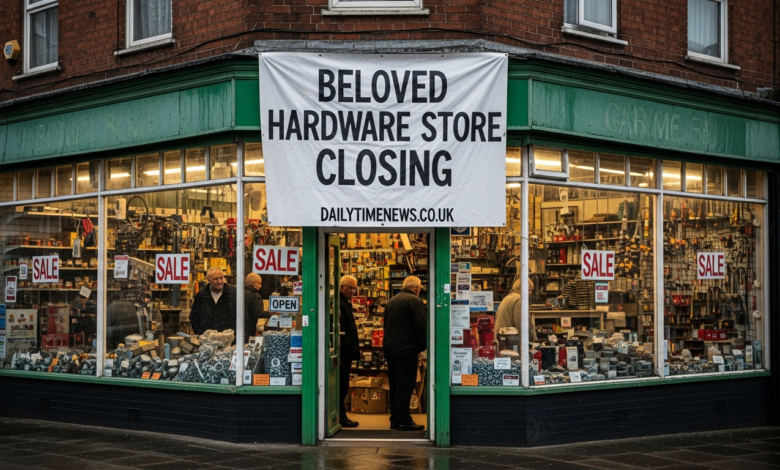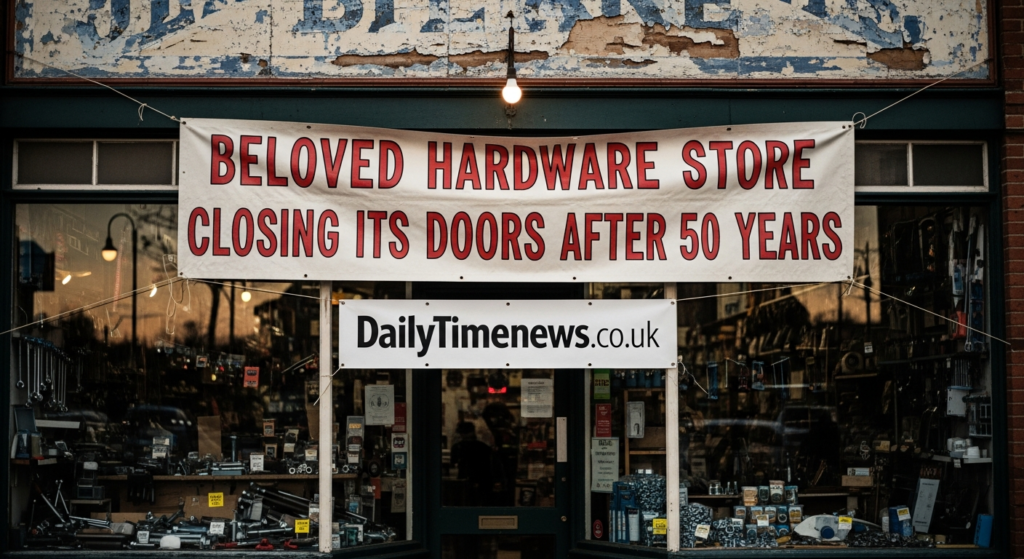Beloved Hardware Store Closing: Essential Survival Guide

Introduction
Walking past the empty storefront where your neighborhood hardware store once stood hits differently than other retail closures. You remember the creaky wooden floors, the smell of fresh-cut lumber, and the owner who knew exactly which screw you needed without even asking. When a beloved hardware store closing happens in your community, it feels like losing a piece of local history and a trusted friend all at once.
These closures aren’t just about losing a place to buy nails and paint. They represent the end of an era where personal service, expert knowledge, and community connection mattered more than low prices and convenience. Across America, independent hardware stores are shutting their doors at an alarming rate, leaving communities to grapple with the loss.
This guide explores why beloved hardware stores are closing, what this means for your community, how to cope with the loss, and where to turn for your hardware needs moving forward. Whether your local store just announced its closure or you want to support the one that’s still standing, you’ll find practical information and actionable steps to navigate this changing retail landscape.
Why Beloved Hardware Stores Are Closing
Understanding the forces behind a beloved hardware store closing helps you appreciate the challenges these businesses face. The reasons extend far beyond simple competition. Multiple factors create a perfect storm that even well-established stores struggle to weather.
The Big Box Competition
Large retail chains fundamentally changed the hardware business model. Home Depot, Lowe’s, and Menards operate on massive scales that independent stores can’t match. They purchase inventory in quantities that secure rock-bottom wholesale prices. This allows them to undercut local stores on price while maintaining healthy profit margins.
The convenience factor also plays a major role. Big box stores offer everything under one roof with extended hours. You can buy lumber, appliances, garden supplies, and tools without visiting multiple locations. For busy customers, this one-stop shopping proves irresistible despite the trade-offs in personal service.
Their marketing budgets dwarf what independent stores can afford. Television commercials, digital advertising, and promotional campaigns keep these chains top of mind. When someone needs hardware, the big box store name pops up first, even if a local alternative exists nearby.
Rising Operational Costs
The cost of running a small hardware store has skyrocketed over the past decade. Commercial rent increases force stores to pay significantly more for the same space. Property taxes, insurance, and utilities all trend upward faster than sales growth can accommodate.
Inventory costs present another challenge. Hardware stores must stock thousands of items to meet customer needs. Tying up capital in slow-moving inventory strains cash flow. Unlike big chains that can quickly redistribute excess stock between locations, independent stores have limited flexibility.
Employee costs continue rising with minimum wage increases and healthcare requirements. While these are positive developments for workers, small businesses with thin margins struggle to absorb the added expenses. Many family-owned stores operated for decades with minimal staff, but changing labor laws and customer expectations require more employees.
Generational Transitions
Many beloved hardware stores closing today trace back to generational transition failures. The original owner built the business over decades but approaches retirement age. Their children often pursue different careers rather than taking over the family business.
Running a hardware store demands specific knowledge and passion. You need to understand products, building codes, construction techniques, and customer service. Not everyone possesses this combination of skills or interest. When the next generation declines to continue the business, closure often follows.
The financial burden of buying out a retiring owner also prevents transitions. Even family members may struggle to afford purchasing the business at fair market value. Without proper succession planning years in advance, beloved hardware stores close unnecessarily.
The Amazon Effect
Online retail has disrupted hardware sales just like every other sector. Customers research products on their phones while standing in stores, then order cheaper alternatives online. This “showrooming” behavior devastates small retailers who can’t compete with online prices.
Amazon’s expansion into tools, home improvement supplies, and even lumber delivery changes customer expectations. Free shipping and next-day delivery make waiting seem unnecessary. Why drive to a store when items arrive at your doorstep tomorrow?
Specialty and hard-to-find items particularly suffer from online competition. These niche products once gave hardware stores competitive advantages. Now, someone seeking an obscure plumbing part can find it online in seconds rather than visiting multiple stores.
The Community Impact When Hardware Stores Close
A beloved hardware store closing creates ripples throughout the community that extend far beyond retail convenience. These impacts affect local economy, neighborhood character, and social fabric in measurable ways.
Economic Consequences
Local hardware stores keep money circulating within the community. They employ local residents, purchase from regional suppliers when possible, and pay taxes that fund municipal services. When they close, this economic activity disappears.
The multiplier effect means each dollar spent locally generates additional economic activity. That hardware store owner eats at local restaurants, uses local accountants, and shops at neighboring businesses. Chain stores extract wealth from communities, sending profits to distant corporate headquarters.
Job losses hit individuals and families hard. Hardware store employees often work there for years or decades. These aren’t just jobs but careers with institutional knowledge and customer relationships. Finding comparable employment proves difficult, especially in smaller communities with limited options.
Loss of Expertise and Service
The knowledge walking out the door when a beloved hardware store closing occurs is irreplaceable. Experienced staff who can diagnose problems, suggest solutions, and explain proper techniques represent invaluable community resources. This expertise took years to develop and can’t be replicated easily.
Big box employees receive basic product training but rarely possess deep practical knowledge. They can point you toward items but seldom offer the nuanced advice a career hardware professional provides. This difference becomes obvious when tackling complex projects or troubleshooting problems.
The personal service aspect disappears completely. Local hardware store owners remember your previous projects and anticipate your needs. They order special items, cut materials to size, and go beyond transactional relationships. This service quality represents something money can’t buy yet gets lost anyway.
Changes to Neighborhood Character
Hardware stores anchor neighborhoods and contribute to walkable, vibrant commercial districts. Their closure often signals broader decline as other businesses struggle and vacant storefronts multiply. The neighborhood character that attracted residents begins eroding.
These stores serve as community gathering places where neighbors connect. You run into friends while shopping, chat with familiar faces, and feel part of something larger. Losing these third places diminishes social cohesion and community identity.
The physical transformation when a beloved hardware store closing occurs changes the streetscape. The building sits empty or converts to uses that don’t serve residents the same way. Each closure makes communities more car-dependent and less walkable, reducing quality of life.

Warning Signs Your Local Hardware Store May Close
Recognizing early indicators helps you prepare for a beloved hardware store closing while there’s still time to support the business. These warning signs don’t guarantee closure but suggest the store faces serious challenges.
Declining Inventory and Selection
When shelves look emptier than usual or previously stocked items become unavailable, the store may be reducing inventory. This cash preservation strategy helps manage financial stress but creates a downward spiral. Customers who can’t find what they need shop elsewhere, further reducing revenue.
Notice whether the store discontinues entire product categories. If they stop carrying major brands or eliminate departments, financial difficulties likely drive these decisions. Healthy businesses expand offerings rather than contracting them.
Empty endcaps, sparse displays, and visible gaps on shelves all signal trouble. Well-run hardware stores maintain full displays because empty spaces look unprofessional and discourage sales. When maintaining appearances becomes too expensive, closure may be imminent.
Reduced Hours and Staff
Operating hour reductions often precede a beloved hardware store closing. If your store that once opened early and closed late now maintains limited hours, they’re cutting costs aggressively. Reduced hours mean less opportunity for sales, creating another negative cycle.
Staff reductions signal financial stress. When the friendly face you’ve known for years suddenly isn’t there, or the owner works alone more often, payroll cuts indicate serious problems. These decisions don’t come easily but become necessary when revenues decline.
The quality of customer service may decline as stress affects remaining staff. Employees worried about their jobs naturally feel less engaged. If the previously helpful and knowledgeable staff seem distracted or less invested, deeper issues exist.
Property Changes and Deferred Maintenance
Notice whether the store maintains its appearance. Peeling paint, broken fixtures, cluttered spaces, and general neglect suggest the owner has stopped investing in the business. This deferred maintenance indicates they’re either unable or unwilling to commit resources.
For sale or for lease signs in windows or nearby properties suggest the owner explores exit options. Commercial real estate listings don’t necessarily mean immediate closure, but they indicate the owner considers alternatives to continuing operations.
Building modifications that reduce retail space signal contraction. If portions of the store get walled off, sublet, or converted to storage, the business is downsizing. These changes rarely reverse once implemented.
How to Support Your Local Hardware Store
If you want to prevent a beloved hardware store closing in your community, taking action now matters more than mourning their loss later. Your choices and advocacy can make genuine differences for struggling businesses.
Shop Local First
Make your neighborhood hardware store your first stop rather than last resort. Even if prices run slightly higher than big box stores, the value in convenience, expertise, and community impact justifies the difference. Consider the true cost including your time, gas, and frustration dealing with chain stores.
Plan purchases to support your local store when possible. They may not stock everything you need, but buying what they do carry helps significantly. Every transaction matters for small businesses operating on thin margins.
Ask whether they can order items not currently in stock. Many hardware stores happily special order products for customers. This demonstrates demand and helps them understand what inventory to add. Be patient with delivery times rather than immediately going elsewhere.
Spread the Word
Tell friends and neighbors about positive experiences at your local hardware store. Word-of-mouth marketing costs nothing but drives business effectively. Social media posts, online reviews, and personal recommendations all help.
When someone asks where to buy hardware supplies, mention your local store first. Don’t assume they already know about it. Many people default to big box stores without considering alternatives simply because those names dominate awareness.
Organize community events or promotions that highlight the store. Partner with other local businesses for shop local initiatives. The collective effort builds momentum that benefits all participating businesses.
Provide Feedback and Ideas
Share constructive feedback with store owners about products, services, or changes that would increase your business. They want to succeed but may not realize what customers want. Your input helps them adapt to changing needs.
Suggest classes, workshops, or events that could attract customers. Many hardware stores successfully host DIY clinics, seasonal workshops, or community events. These activities build loyalty while generating sales.
Be understanding about limitations while remaining honest about needs. Small businesses can’t compete on every dimension with large chains, but they can carve niches and excel in specific areas. Help them identify where they can win.
Finding Alternatives After a Hardware Store Closes
When a beloved hardware store closing becomes inevitable, you need practical alternatives for your hardware needs. Multiple options exist, each with advantages and trade-offs to consider.
Other Independent Hardware Stores
Search for other local hardware stores in your area. They may be located in neighboring communities or different parts of your city. These stores face similar challenges and deserve your support. The drive might be longer, but you’ll maintain the personal service and expertise you value.
Ace Hardware, True Value, and Do it Best represent cooperative buying groups for independent stores. Member stores gain purchasing power advantages while maintaining local ownership. These stores often provide excellent middle ground between pure independents and big box chains.
Building supply companies sometimes serve retail customers alongside their contractor business. They stock professional-grade materials and employ knowledgeable staff. Prices may be higher, but quality and expertise often exceed alternatives.
Big Box Stores with Strategy
If big box stores become your only option, shop strategically to maximize value. Use their price advantages for commodity items like lumber, concrete, and bulk materials. Their scale provides legitimate benefits for these products.
Avoid relying on staff for expert advice. Do your research online beforehand and know exactly what you need. Consider big box stores as self-service warehouses rather than full-service hardware stores. Adjust your expectations accordingly.
Take advantage of their return policies and guarantees. These stores can absorb returns and exchanges that might burden smaller businesses. Don’t abuse these policies, but use them when legitimately needed.
Online Hardware Retailers
Specialized online hardware retailers offer vast selections impossible for physical stores to maintain. Sites focusing on specific niches like plumbing, electrical, or specialty tools provide products you can’t find locally. Their expert staff often provides phone support that rivals or exceeds in-person advice.
Amazon and other general retailers work for common items you know exactly what you need. Compare prices and read reviews carefully. Be cautious about counterfeit products and unclear specifications that plague online marketplaces.
Factor in shipping costs and delivery times when comparing prices. That online bargain may not save money after shipping. Needing items immediately makes next-day Amazon delivery worth premium prices versus in-store purchases.
Contractor Supply Businesses
Many contractor-focused suppliers welcome retail customers. These businesses cater to professionals but often sell to anyone. You’ll find higher quality products and more knowledgeable staff than big box stores.
Expect slightly higher prices reflecting professional-grade quality. The materials and tools contractors use daily must withstand heavy use. This durability provides value for homeowners too, even if initial costs run higher.
Building relationships with contractor suppliers takes time. Once they recognize you as a regular customer, service improves significantly. Ask questions, be respectful of their professional focus, and become a valued customer rather than an inconvenience.
Preserving Hardware Store Memories and History
When a beloved hardware store closing becomes final, documenting and preserving its history honors the business and creates community records. These efforts ensure the store’s contributions aren’t forgotten.
Collecting Oral Histories
Interview the owners and long-time employees while the opportunity exists. Record their stories, memories, and perspectives on the business and community. These oral histories provide invaluable insights into local history and changing retail landscapes.
Ask about memorable customers, unusual requests, funny incidents, and how the business evolved. These personal narratives bring history to life in ways written records can’t capture. Transcribe recordings to make them accessible for future researchers.
Contact local historical societies or libraries about preserving these oral histories. Many organizations actively collect community histories and will welcome this material. Your effort today becomes tomorrow’s historical resource.
Photographic Documentation
Photograph the store’s interior and exterior while it still operates. Capture details like signage, product displays, architectural features, and the physical space. These images document what will soon disappear.
Take photos of staff, owners, and regular customers who define the store’s character. Candid shots of daily operations prove more valuable than posed portraits. Try capturing the atmosphere and experience alongside physical details.
Share photographs with local history groups, libraries, and online community archives. These images belong to community heritage. Making them publicly accessible ensures future generations can understand what existed before.
Preserving Physical Items
Ask the owner about purchasing or preserving significant items before final liquidation. Vintage signs, original fixtures, or historical documents might otherwise end up discarded. These artifacts deserve preservation in museums, historical societies, or private collections.
Product catalogs, price lists, advertisements, and business records document commercial history. Encourage owners to donate these materials to appropriate archives rather than throwing them away. Researchers decades from now will thank you.
Consider whether your community has a local history museum that might create an exhibit about the store or broader retail history. Provide materials and support to make this happen. Public recognition honors the business while educating community members.
The Future of Independent Hardware Stores
Despite challenges, independent hardware stores aren’t extinct. Understanding emerging trends helps you recognize stores positioned to survive while appreciating why others couldn’t adapt. The future looks different but not necessarily bleak.
Successful Adaptation Strategies
Surviving hardware stores embrace specialization rather than trying to match big box breadth. They focus on specific niches where expertise and service matter more than price. Plumbing specialists, paint stores, and tool shops succeed by going deep rather than wide.
Many stores build hybrid models combining retail with contractor services. Installation, repair, and specialized contracting provides stable revenue streams supplementing retail sales. This diversification buffers against retail challenges.
E-commerce integration helps rather than hurts when done strategically. Local stores with online ordering, curbside pickup, and delivery compete effectively. They combine personal service with modern conveniences customers expect.
Community-Supported Models
Some beloved hardware stores avoid closing through creative ownership structures. Employee ownership, community investment, or cooperative models distribute financial burden while deepening community connections. These alternatives to traditional business models show promise.
Community fundraising or investment campaigns can provide capital for stores struggling financially. Local residents who value the store can become stakeholders with financial and emotional investments in success. This shared ownership strengthens resolve to support the business.
Municipal support through grants, favorable leases on publicly owned property, or tax incentives helps level playing fields tilted toward large chains. Communities recognizing hardware stores as essential services can take concrete steps to ensure their survival.
Technology and Innovation
Modern point-of-sale systems, inventory management, and customer relationship software help independent stores compete more effectively. Technology that was once prohibitively expensive has become affordable and essential for surviving in today’s market.
Social media and digital marketing allow hardware stores to reach customers cost-effectively. A strong online presence brings awareness and drives traffic without massive advertising budgets. Stores embracing digital tools access opportunities previous generations couldn’t imagine.
Augmented reality apps, online project planning tools, and virtual consultations represent emerging opportunities. Hardware stores adopting these innovations provide value beyond what big boxes or online retailers offer. Technology becomes an ally rather than threat when used strategically.
Lessons from Hardware Store Closures
Each beloved hardware store closing teaches valuable lessons about community, commerce, and what we lose when chasing only the lowest price. Reflecting on these lessons shapes better choices moving forward.
The True Cost of Convenience
Shopping at big box stores or online seems convenient, but hidden costs exist. The time spent navigating enormous stores, dealing with unknowledgeable staff, or returning products bought online without proper guidance adds up. Convenience isn’t always what it appears.
Communities pay prices too. Job losses, declining commercial districts, and eroding social connections represent real costs not captured in product prices. The cheapest transaction doesn’t account for comprehensive community costs.
Personal costs include frustration, project delays, and mistakes made without expert guidance. How many projects took longer or turned out worse because you lacked advice an experienced hardware store employee would have provided freely?
Value of Local Ownership
Locally owned businesses invest in communities differently than corporate chains. Owners live in the community, serve on nonprofit boards, sponsor youth sports teams, and care about neighborhood wellbeing beyond profit margins.
The flexibility of local ownership allows personalized service and accommodation impossible within corporate structures. That hardware store owner who opened early for your emergency repair or ordered special items serves the community in ways no employee of a distant corporation can replicate.
Building relationships with local business owners creates social capital that strengthens communities. These connections matter during emergencies, economic downturns, or times when communities must come together. Every beloved hardware store closing weakens this social fabric.
Supporting What We Value
Claiming to value local businesses while shopping primarily at chains represents disconnect between stated values and actions. If independent hardware stores matter to you, your purchasing decisions must reflect that priority. Businesses survive on revenue, not good intentions.
The time to support stores you value is before they close, not after. Mourning their loss while having contributed to it through shopping choices elsewhere rings hollow. Aligning actions with values requires conscious choices and occasional sacrifice.
Understanding that sustainable communities require economic diversity helps frame purchasing decisions. A town with only chain stores lacks resilience and character. Preserving diverse retail ecosystems requires actively supporting various business types, including hardware stores that form community backbones.

Conclusion
A beloved hardware store closing represents more than a business failure. It marks the loss of community anchors, expertise, and gathering places that enrich neighborhoods. Understanding why these closures happen, their impacts, and how to respond helps communities navigate these transitions while hopefully preventing future losses.
The factors driving hardware store closures combine competition, costs, generational transitions, and changing consumer behavior. While challenging, these forces aren’t completely insurmountable. Stores that adapt, specialize, and maintain strong community connections can survive and even thrive.
Your choices matter more than you might think. Shopping local first, spreading word about great businesses, and recognizing the true value of personal service all contribute to keeping hardware stores open. Don’t wait until closure announcements to regret not supporting businesses you value.
Whether your local hardware store still stands or has already closed, take action today. Support it if it exists, document its history if it’s closing, and make conscious choices about where you spend money. Communities that lose these businesses rarely regain them. The time for action is now, not after the doors close forever.
What role has your local hardware store played in your life? Have you witnessed a beloved hardware store closing in your community? Share your experiences and let’s discuss how we can preserve these essential businesses before more disappear.
Frequently Asked Questions
Why are so many independent hardware stores closing? Independent hardware stores face intense competition from big box retailers and online sellers who operate at scales allowing lower prices. Rising operational costs including rent, inventory, and labor make profitability difficult. Many stores also struggle with generational transitions when owners retire without successors willing to continue the business.
What happens to employees when a hardware store closes? Employees face job loss and must seek employment elsewhere. Long-term staff with specialized hardware knowledge often struggle finding comparable positions that value their expertise. Some transition to big box stores but typically at lower wages or with less job satisfaction. Others leave the retail sector entirely.
How can I help prevent my local hardware store from closing? Shop there regularly rather than treating it as a last resort. Buy items locally even if prices are slightly higher than chains. Spread positive word-of-mouth and online reviews. Be patient with special orders rather than immediately shopping elsewhere. Provide constructive feedback to help them improve. Every purchase and customer loyalty matters significantly.
What should I do with unused gift cards if a hardware store closes? Contact the store owner immediately as they may honor gift cards during liquidation sales. State laws vary regarding gift card obligations during business closures. Some owners honor them from personal funds while others legally cannot. Act quickly as options diminish once final closure occurs.
Where can I find expert hardware advice after my local store closes? Look for other independent hardware stores in neighboring areas or Ace Hardware and True Value locations maintaining local ownership. Building supply companies serving contractors often employ knowledgeable staff. Online forums, YouTube tutorials, and manufacturer hotlines provide guidance. Consider developing relationships with reliable contractors who can advise on projects.
Can anything bring back a hardware store after it closes? Once closed, hardware stores rarely reopen. The specialized knowledge, supplier relationships, and customer base take years to develop and can’t be easily recreated. The best approach is preventing closures through active support. Some communities have successfully launched new cooperative or community-owned stores, but these represent significant undertakings.
Are hardware store buildings usually repurposed after closing? Repurposing depends on location and building characteristics. Some become restaurants, offices, or other retail stores. Others sit vacant, especially in declining commercial areas. Prime locations typically find new tenants relatively quickly. Buildings in struggling districts may remain empty for years, contributing to neighborhood decline.
Do big box hardware stores offer any advantages over local stores? Big box stores provide lower prices on many items through bulk purchasing. They offer wider selection and convenient one-stop shopping for major projects. Extended hours and consistent nationwide inventory help travelers and those working odd hours. However, they lack personalized service, specialized expertise, and community connection that independent stores provide.
How do I research local hardware store history before it’s too late? Interview owners and long-time employees while they’re available. Check local historical societies and libraries for existing records. Search newspaper archives for grand opening announcements, advertisements, and articles. Take photographs of the building, interior, and signage. Collect business documents like catalogs, price lists, and promotional materials with owner permission.
What role do hardware stores play in community resilience? Hardware stores provide essential supplies during emergencies and natural disasters when big box stores may be inaccessible or overwhelmed. Local owners prioritize community needs during crises. They serve as information hubs where neighbors connect and share resources. Their expertise helps people maintain and repair homes affordably, supporting community stability and self-sufficiency.
Also Read Dailytimenews.co.uk



